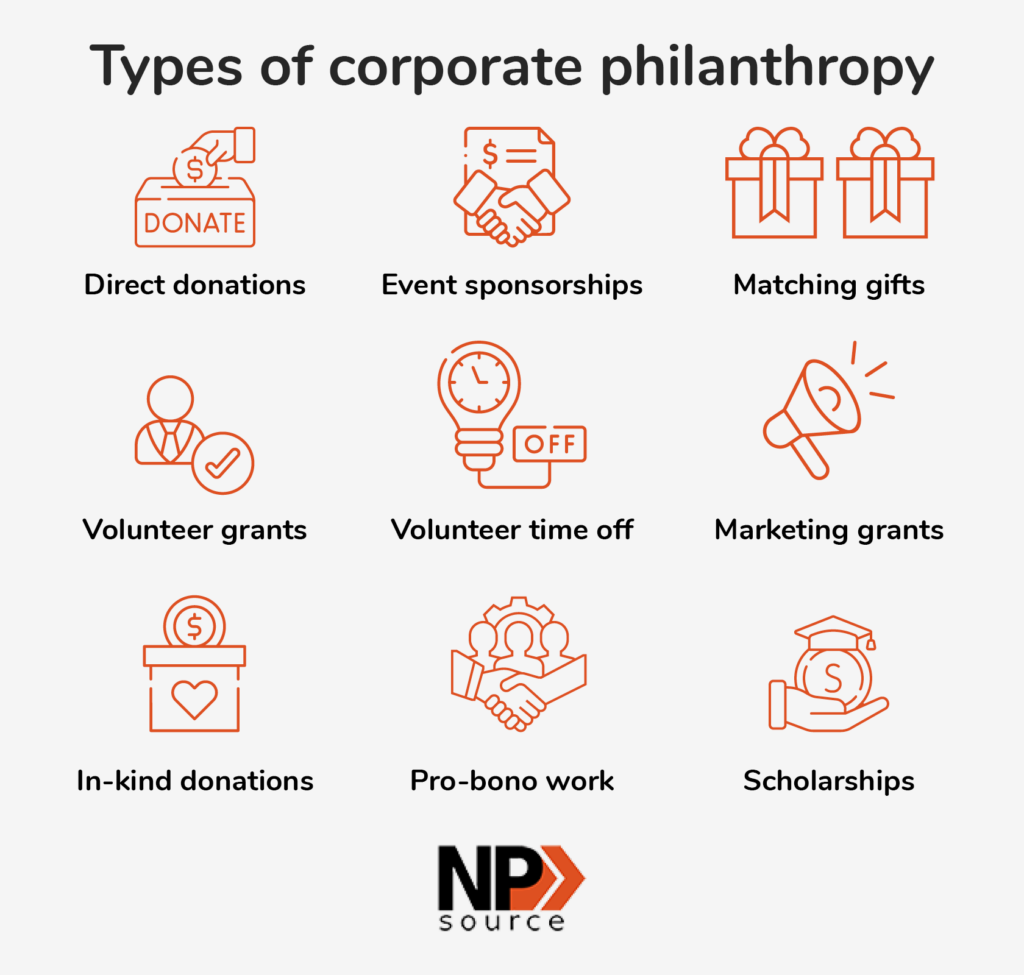The Function of Business Philanthropy in Fostering Sustainable Organization Practices
Corporate philanthropy has become a critical strategy for organizations aiming to incorporate sustainability into their procedures. By straightening company objectives with ecological and social initiatives, organizations can promote healthier ecological communities. This approach not only improves company reputation but also enhances stakeholder connections. Nonetheless, the real level of its influence on lasting company success stays to be checked out. What ingenious practices are being adopted because of this?
Comprehending Corporate Philanthropy and Its Importance
Corporate philanthropy functions as a vital system where companies can contribute to social health while boosting their very own track records. This method involves companies assigning resources, such as funds, time, or knowledge, to support community efforts, charitable causes, or social programs. By taking part in kind efforts, companies can deal with pressing social concerns, such as education, healthcare, and ecological worries, thus playing a pivotal function in fostering favorable adjustment.
Business philanthropy can boost worker spirits and attract talent, as people progressively look for to work for socially liable companies. It can also reinforce customer commitment, as consumers favor brand names that demonstrate a dedication to making a distinction. Inevitably, recognizing the value of corporate philanthropy exists in recognizing its twin benefits: enhancing neighborhood welfare while concurrently enhancing service trustworthiness and reliability in the eyes of stakeholders. This placement of social obligation with business passions underscores its relevance in today's corporate landscape.
The Link In Between Corporate Philanthropy and Sustainability
While lots of firms participate in philanthropy to improve their public photo, a deeper connection exists in between business philanthropy and sustainability. Company philanthropy typically straightens with lasting practices by supporting efforts that resolve environmental and social difficulties. They contribute to a healthier ecological community and society when businesses invest in community projects, renewable power, or instructional programs. This dedication not just promotes a good reputation yet also strengthens stakeholder relationships, enhancing brand name commitment.

Instance Studies: Effective Business Philanthropy Initiatives
Many business have successfully incorporated humanitarian initiatives right into their organization methods, demonstrating the tangible benefits of such commitments. For circumstances, Microsoft has actually introduced numerous programs, such as its AI for Planet initiative, which sustains ecological sustainability via technology. This method not only help conservation initiatives but additionally enhances Microsoft's credibility as a leader in business obligation.
Unilever's Sustainable Living Strategy emphasizes ecological and social impact, straightening its philanthropy with company purposes. By funding jobs that boost hygiene and cleanliness, Unilever reinforces its brand while adding to global health and wellness.
An additional remarkable instance is Patagonia, which pledges 1% of sales to ecological reasons. This dedication resonates with customers, cultivating loyalty and driving sales.
These situation researches highlight that reliable company philanthropy can yield monetary returns while advertising lasting techniques, enhancing the idea that moral organization practices are helpful for both culture and profits.
Building Stronger Stakeholder Relationships With Philanthropy
Philanthropy serves as a crucial device for companies seeking to strengthen their connections with stakeholders, as it cultivates trust and shows a dedication to social obligation. By involving in philanthropic efforts, organizations can connect with local communities, enhancing their credibility and encouraging stakeholder commitment. This involvement usually leads to purposeful communications, producing a feeling of shared worths between the business and its stakeholders.
Philanthropic initiatives can attend to details area requirements, allowing companies to add positively to societal challenges. This participation not only showcases a company's moral position however likewise helps in bring in and maintaining customers that focus on social responsibility.
Additionally, staff members typically feel extra determined and involved when they see their organization proactively joining philanthropic tasks, leading to a more efficient workplace society. As a result, company philanthropy comes to be a calculated avenue for constructing stronger, extra resilient partnerships with varied stakeholder groups.
Determining the Impact of Company Philanthropy on Company Success
The connection between corporate philanthropy and stakeholder interaction establishes the phase for evaluating its effect on overall service success. Organizations frequently determine this effect via numerous metrics, including brand name online reputation, employee complete satisfaction, and client commitment. Philanthropic initiatives can enhance a business's picture, cultivating trust fund amongst customers and investors alike. In addition, engaged workers often tend to show higher spirits and efficiency, straight associating to boosted service efficiency.
Measurable analysis can also be utilized, with organizations examining monetary returns against philanthropic expenses. Study shows that business with strong philanthropic dedications frequently experience greater supply efficiency and lowered volatility. Furthermore, qualitative assessments, such as stakeholder responses, can give understandings right into community assumptions and lasting relational advantages.
Inevitably, measuring the impact of company philanthropy requires a multifaceted strategy, incorporating both quantitative and qualitative information to guarantee a complete understanding of its impact on business success. corporate philanthropy.
Regularly Asked Concerns
How Can Small Companies Participate In Corporate Philanthropy Successfully?

What Prevail Mistaken Beliefs Regarding Company Philanthropy?

Just How Does Business Philanthropy Influence Staff Member Spirits?
Business philanthropy positively affects worker spirits by promoting a sense of objective, boosting work fulfillment, and advertising loyalty. Staff members commonly really visit the site feel much more engaged and motivated when their firm adds to social reasons, developing a helpful workplace.
What Are the Tax Obligation Advantages of Corporate Philanthropy for Organizations?
Corporate philanthropy supplies significant tax benefits for services, including deductions on philanthropic contributions and prospective reductions in taxed income. These rewards urge companies to take part in social initiatives while concurrently enhancing their economic standing.
How Can Business Pick Effective Philanthropic Allies?
Firms can choose efficient kind partners by reviewing alignment with their values, assessing influence potential, examining financial transparency, and promoting solid interaction. This tactical method improves cooperation and guarantees shared advantages for both events entailed.
Corporate philanthropy serves as a vital mechanism with which services can add to social health while boosting their very own reputations - corporate philanthropy. Eventually, recognizing the relevance of company philanthropy exists in identifying its twin advantages: improving community welfare while at the same he has a good point time improving company trustworthiness and dependability in the eyes of stakeholders. While lots of business involve in philanthropy to improve their public picture, a deeper connection exists between company philanthropy and sustainability. The link in between business philanthropy and stakeholder interaction sets the stage for evaluating its influence on total service success. Business philanthropy provides considerable tax advantages for services, including deductions on philanthropic payments and prospective reductions in taxed earnings